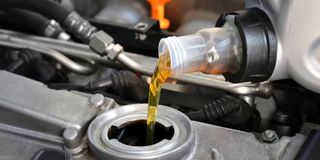Prime
Ask the Mechanic: Fluid service tips

Hello Paul, I am a new owner of an old Mercedes Benz C class given to me by my late uncle. I would like to look after this 20-year-old car which seems to be in immaculate condition. Kindly give me some maintenance tips.
Kampe
Hello Kampe, there is an old adage; if you care for your car, it will care for you. Start by learning how to maintain the engine and transmission fluids. Fluids are important for the operation and protection of hot and fast moving engine and transmission components. You can categorise these fluids as: lubricants and coolants.
Where applicable consider the maintenance replacement of filters. With fluids you need to monitor the levels and quality (colour and viscosity). It is important to know from your car user manual what the manufacturer recommended fluid viscosities and grades are.
These should be secured from a reputable dealer. For instance Mercedes provides information about recommended engine and transmission oil grades in the user manual. Online Mercedes even lists the different alternative engine and transmission oil brands that meet the service requirements of different Mercedes car models. Looking closer at fluids, with engine oil you are safer considering multi grade oil (15W40) from reputable oil companies. The age and mileage of your car is an important factor. An engine oil drain period of 5,000kms is a good start, if the engine is over 200,000kms or shows signs of leaking or excessive burning of oil then you would have to use a mono grade oil (40 SAE) with a shorter drain interval of 3,000 kms.
Transmission oils are also specific according to the manufacturer. In your case you can use a reputable Dexron ii or iii fully synthetic transmission oil for your gearbox. A good gearbox drain interval is 50,000kms or four years, whichever comes first. For your car Mercedes gearbox oil is also available at the local Mercedes Benz dealer. A filter change is mandatory at every oil drain for the engine and gearbox. Other fluids include the steering fluid which uses Automatic Transmission fluid ATF.
This can be drained after three years, depending on the colour of the fluid. Brake hydraulic fluid should be replaced every two to three years because it attracts moisture as you operate the brakes. Engine coolant fluid should be changed every two years as it loses its protective and performance attributes.
At every service, check or replace the air filter, brake pads (where they do not meet the recommended pad width). Inspect or rotate tyres, test all lights and inspect the suspension at every service.

DO I NEED TO IDLE MY CAR ENGINE?
Growing up, I watched my father switch on the car engine and allow the family car to idle for about 15 minutes before driving. Out of habit I do the same thing but a friend told me it is not necessary. What is your expert opinion?
Abdallah.
Hello Abdallah, generally speaking, modern cars built after 2000 do not need to be idled for 15 minutes after cold start. This is not only leads to fuel wastage but also contributes to polluting the environment. It is easy to burn up to quarter a tank of petrol by idling for 15 minutes over the duration of one week. It is true that older vehicles built between the 50s and 80s with carburetors and older air intake systems needed choking or time to warm up so they could attain stable running.
The same older vehicles largely used mineral grade oils which needed a little more time to warm up and flow around the engine before you revved it up. It was important for your father to allow the car engine idle a little longer to ensure it was warm enough to allow stable running as well as sufficient lubrication for the safety of fast moving engine components.
However, car engines today have electronic throttle units that work with engine management sensors to manage cold start engine enrichment by running the engines at slightly higher revolutions to warm them up before dropping the revs to normal idling. The reputable lubricants on the market today are blended with additives and synthetics, which allow instantaneous flow around the engine within a few seconds.
Modern car lubrication systems are also designed to allow quick oil flow from the sump to the valve train and around the engine instantaneously. You can comfortably drive off after five seconds as long as you use reputable lubricants and keep your car ignition and air intake system properly tuned and serviced.
Send sms: mycar (space) your comments and questions to 6933
Or email them to: [email protected]




